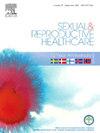黑人对生育护理的看法:范围审查
IF 1.7
3区 医学
Q3 PUBLIC, ENVIRONMENTAL & OCCUPATIONAL HEALTH
引用次数: 0
摘要
辅助生殖技术(ART),如体外受精(IVF),为不孕症患者带来了希望。研究表明,不同种族群体在获得生育护理的机会和经验方面存在差异,尤其是黑人妇女。本综述旨在探讨黑人妇女对生育护理的看法和她们在获得护理时遇到的社会心理障碍。此范围审查遵循系统审查和范围审查扩展元分析首选报告项目(PRISMA-ScR)清单。三个数据库包括OVID Medline, PubMed和Embase,使用关键词搜索了12项研究,这些研究探讨了黑人妇女生育护理的障碍。确定的障碍包括医生之间的歧视、缺乏知识和缺乏文化敏感性。治疗的经济费用是不孕症治疗最常见的障碍。确定不孕不育治疗的促进因素包括对治疗计划和程序的全面了解,文化上有能力的提供者,以及对患者的生育咨询,包括对现有不孕不育治疗保险范围的教育。认识到体外受精结果的差异,并确定治疗的障碍和促进因素,是改善生育护理结果的重要的第一步。本文章由计算机程序翻译,如有差异,请以英文原文为准。
Perceptions of the Black population on fertility care: A scoping review
Assisted reproductive technologies (ART), such as in vitro fertilization (IVF), offer hope for people struggling with infertility. Studies demonstrate that disparities in access and experiences with fertility care exist among different racial groups, particularly affecting Black women. This scoping review aims to explore Black women’s perceptions of fertility care and psychosocial barriers that they encounter when accessing care. This scoping review follows the Preferred Reporting Items for Systematic Reviews and Meta-Analyses Extension for Scoping Reviews (PRISMA-ScR) Checklist. Three databases including OVID Medline, PubMed, and Embase, were searched using keywords that resulted in 12 studies that explored barriers to fertility care for Black women. Identified barriers included discrimination, lack of knowledge, and a lack of cultural sensitivity among physicians. The financial cost of treatment was the most frequently reported barrier to infertility treatment. Identified facilitators to infertility treatment included a thorough understanding of the treatment plan and procedures, culturally competent providers, and fertility counseling for patients including education on existing insurance coverage for infertility treatments. Recognizing disparities in IVF outcomes, and identifying both barriers and facilitators to treatment, is an essential first step toward improving fertility care outcomes.
求助全文
通过发布文献求助,成功后即可免费获取论文全文。
去求助
来源期刊

Sexual & Reproductive Healthcare
PUBLIC, ENVIRONMENTAL & OCCUPATIONAL HEALTH-
CiteScore
2.70
自引率
5.60%
发文量
73
审稿时长
45 days
 求助内容:
求助内容: 应助结果提醒方式:
应助结果提醒方式:


